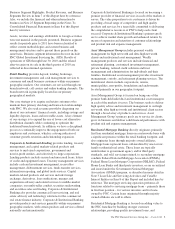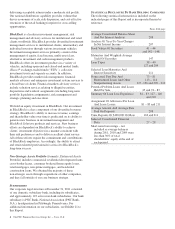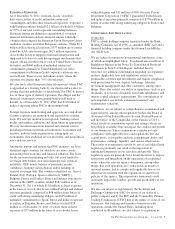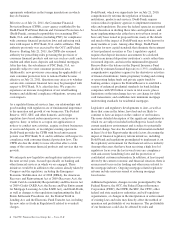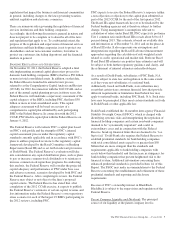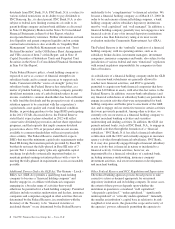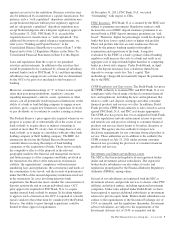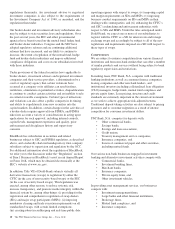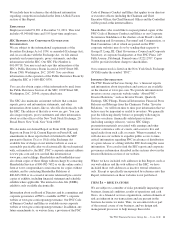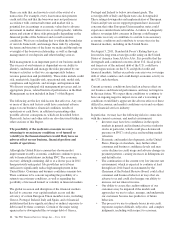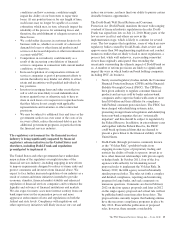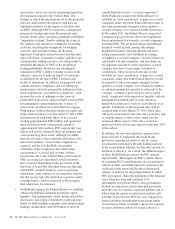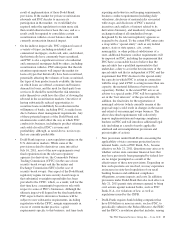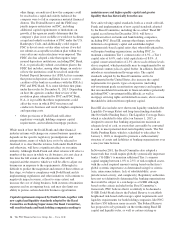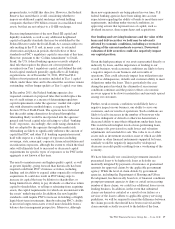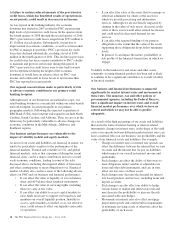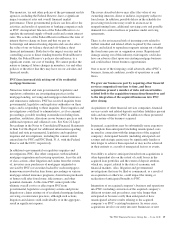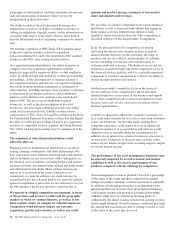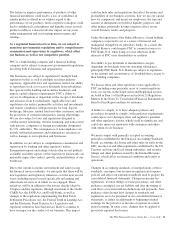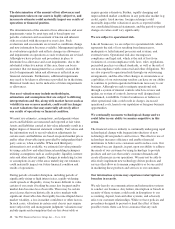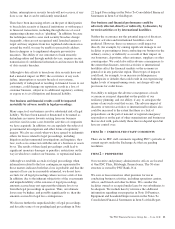PNC Bank 2011 Annual Report Download - page 22
Download and view the complete annual report
Please find page 22 of the 2011 PNC Bank annual report below. You can navigate through the pages in the report by either clicking on the pages listed below, or by using the keyword search tool below to find specific information within the annual report.conditions and how economic conditions might
impair the ability of our borrowers to repay their
loans. At any point in time or for any length of time,
such losses may no longer be capable of accurate
estimation, which may, in turn, adversely impact the
reliability of the process for estimating losses and,
therefore, the establishment of adequate reserves for
those losses.
• We could suffer decreases in customer desire to do
business with us, whether as a result of a decreased
demand for loans or other financial products and
services or decreased deposits or other investments in
accounts with PNC.
• Competition in our industry could intensify as a
result of the increasing consolidation of financial
services companies in connection with current market
conditions, or otherwise.
• Increased regulation of compensation at financial
services companies as part of government efforts to
reform the industry may hinder our ability to attract,
retain and incentivize well-qualified individuals in
key positions.
• Investors in mortgage loans and other assets that we
sell or sold are more likely to seek indemnification
from us against losses or otherwise seek to have us
share in such losses or to request us to repurchase loans
that they believe do not comply with applicable
representations and warranties or other contractual
provisions.
• We may be subject to additional fees and taxes as the
government seeks to recover some of the costs of its
recovery efforts, reduce the national debt or pay for
additional government programs, in particular from
the financial services industry.
The regulatory environment for the financial services
industry is being significantly impacted by financial
regulatory reform initiatives in the United States and
elsewhere, including Dodd-Frank and regulations
promulgated to implement it.
The United States and other governments have undertaken
major reform of the regulatory oversight structure of the
financial services industry, including engaging in new efforts
to impose requirements designed to reduce systemic risks and
protect consumers and investors from financial abuse. We
expect to face further increased regulation of our industry as a
result of current and future initiatives intended to provide
economic stimulus, financial market stability and enhanced
regulation of financial services companies and to enhance the
liquidity and solvency of financial institutions and markets.
We also expect in many cases more intense scrutiny from our
bank supervisors in the examination process and more
aggressive enforcement of laws and regulations on both the
federal and state levels. Compliance with regulations and
other supervisory initiatives will likely increase our cost and
reduce our revenue, and may limit our ability to pursue certain
desirable business opportunities.
The Dodd-Frank Wall Street Reform and Consumer
Protection Act (Dodd-Frank) mandates the most wide-ranging
overhaul of financial industry regulation in decades. Dodd-
Frank was signed into law on July 21, 2010. Many parts of the
law are now in effect and others are now in the
implementation stage, which is likely to continue for several
years. The law requires that regulators, some of which are new
regulatory bodies created by Dodd-Frank, draft, review and
approve more than 300 implementing regulations and conduct
numerous studies that are likely to lead to more regulations, a
process that, while well underway, is proceeding somewhat
slower than originally anticipated, thus extending the
uncertainty surrounding the ultimate impact of Dodd-Frank on
us. A number of reform provisions are likely to significantly
impact the ways in which banks and bank holding companies,
including PNC, do business.
• Newly created regulatory bodies include the Consumer
Financial Protection Bureau (CFPB) and the Financial
Stability Oversight Council (FSOC). The CFPB has
been given authority to regulate consumer financial
products and services sold by banks and non-bank
companies and to supervise banks with assets of more
than $10 billion and their affiliates for compliance
with Federal consumer protection laws. The FSOC has
been charged with identifying systemic risks,
promoting stronger financial regulation and identifying
those non-bank companies that are “systemically
important” and thus should be subject to regulation by
the Federal Reserve. In addition, in extraordinary cases
and together with the Federal Reserve, the FSOC
could break up financial firms that are deemed to
present a grave threat to the financial stability of the
United States.
• Dodd-Frank (through provisions commonly known
as the “Volcker Rule”) prohibits banks from
engaging in some types of proprietary trading and
restricts the ability of banks to sponsor, invest in or
have other financial relationships with private equity
or hedge funds. In October 2011, four of the five
agencies with authority for rulemaking issued
proposed rules to implement the Volcker Rule. In
January 2012, the fifth agency issued substantially
similar proposed rules. The rules set forth a complex
and detailed compliance, reporting and monitoring
program for large banks, and seek comments on
numerous questions. Comments are due in February
2012 on the four agency proposals and later in 2012
on the single agency proposal and a final rule will not
be published until some time after those dates. The
proposed rules currently require that banking entities
have the necessary compliance programs in place by
July 2012. Even with the publication of proposed
rules, however, there remains considerable
The PNC Financial Services Group, Inc. – Form 10-K 13


